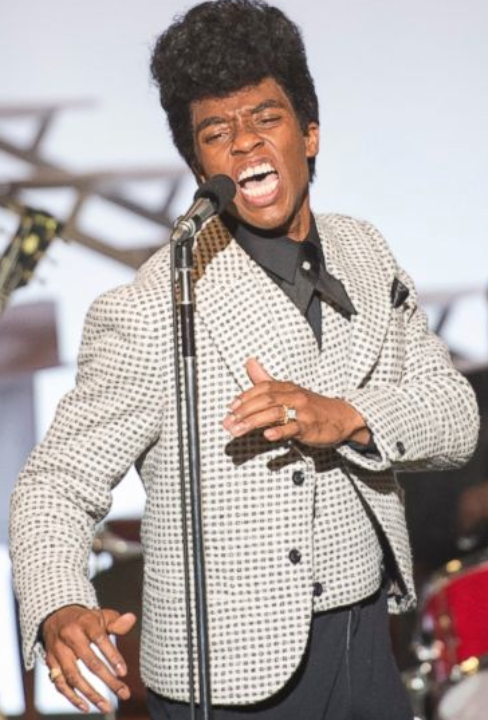 Get on Up, the music biopic about the late, great James Brown, does not live up to its subject. Sure, Chadwick Boseman (42) embodies the Godfather of Soul with enough super-bad splendor that he’ll likely nab that Oscar nod Hollywood loves to bestow upon actors who portray musicians. But the truth is that, in these 138 minutes of highly selective, highly redundant flashbacks, papa’s got a brand-new mixed bag.
Get on Up, the music biopic about the late, great James Brown, does not live up to its subject. Sure, Chadwick Boseman (42) embodies the Godfather of Soul with enough super-bad splendor that he’ll likely nab that Oscar nod Hollywood loves to bestow upon actors who portray musicians. But the truth is that, in these 138 minutes of highly selective, highly redundant flashbacks, papa’s got a brand-new mixed bag.
The problem with music biopics is we’re dealing with rockstars – people who became famous because no one in the world was like them. Their life trajectory may be monotonously consistent – the humble beginnings, the how-they-got-discovered fable, the fact that the exact over-the-top outrageousness that made them a success became their undoing – but what’s unique is their charisma. So trying to emulate these one-of-a-kind musicians is like putting a backup singer at the lead singer’s mic and expecting no one to mind. All too often, the best we can say about a music biopic is what we say about films like Ray, The Buddy Holly Story, and now Get on Up: The actor did a good impression. Talk about damning with faint praise.
Worse, filmmakers tend to take a very conventional, even soapy approach to these extremely unconventional people’s lives. As Grantland’s Steven Hyden points out, most music biopics “insert the idea of a famous icon into a classic melodrama story line. It’s like making Terms of Endearment about ‘Batman.'” To be fair, films about musicians face the same challenges as all biopics do: Stick too closely to the real arc of a person’s life and get bogged down; take too many liberties and disappoint the literalists.
But the real trick to a successful music biopic may be to get as un-literal as possible. After all, some of the best ones ever made are not even technically biopics. Purple Rain and 8 Mile, for example, are fictional features based on the rock stars (Prince and Eminem, respectively) who star in them, and everyone’s secret favorite, Eddie and the Cruisers, is about a beloved rock and roller who never even existed. These films work because music is about a moment as much as it’s about a person. More than anything else, music is a cultural zeitgeist, and we shouldn’t invoke such zeitgeists without the same level of innovation as that which created them in the first place.
Without further fanfare, then, here’s a completely biased, totally subjective list of the top 11 music biopics. (Consider that number an homage to the best music biopic never made, Rob Reiner’s classic mockumentary This Is Spinal Tap.)
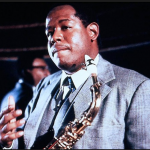 Bird (1988)
Bird (1988)
Though Clint Eastwood’s recent directorial efforts have proved increasingly soulless, his 1988 biopic about Charlie Parker is anything but – possibly because the helmer is such a jazz enthusiast that he even composes and plays the music in his alleged downtime. Sure, the film cleaves to the traditional biopic structure but it takes its aesthetic cues from the mood-indigo impressionism of the legendary saxophonist. And as Bird, a young Forest Whitaker established once and for all that he could carry anything on his strapping shoulders.
 Amadeus (1984)
Amadeus (1984)
The best music biopics often focus on a phenomenon rather than the musician itself. This Oscar-winning 1984 extravaganza about the fraught relationship between Mozart (Tom Hulce) and that lesser talent Salieri (F. Murray Abraham) conveys the elusive nature of genius and jealousy in dizzying gales of glory and despair. And leave it to director Milos Forman to (accurately) portray the revered classical composer as the world’s first punk rocker.
 A Hard Day’s Night (1964)
A Hard Day’s Night (1964)
While one could argue that Richard Lester’s 1964 scripted film about the Beatles is a documentary since it actually stars The Fab Four, this days-in-the-life feature is so stylized and wonderfully winky that it feels like fiction in the very best of ways. Shot in crisp black and white, it’s really about the freedom of youth back when people believed the future was bright.
Coal Miner’s Daughter(1980)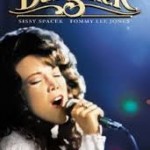
Sure, this 1980 rags-to-riches story about country singer Loretta Lynn is about as orthodox as they come. But its overearnestness – as well as Sissy Spacek’s heartbreaking, Oscar-winning performance as Lynn – serves to build out a terrific mid-century time capsule of hopes and dreams in rural, working-class America.

Sid & Nancy (1986)
Talk about a time capsule. Alex Cox’s 1986 account of the wild, and wildly ill-fated, love affair between Sex Pistols singer Sid Vicious (Gary Oldman) and the ravishingly ravaged Nancy Spungen (Chloe Webb) doesn’t just capture punk rock. It is punk rock, and it’s got the broken bones and gallows humor to prove it. Bonus: a cameo from a very young Courtney Love.
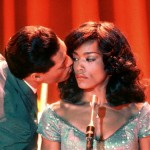 “What’s Love Got to Do With It?” (1993)
“What’s Love Got to Do With It?” (1993)
About the abusive relationship between Ike and Tina Turner, this music biopic largely draws on the latter’s bestselling biography and so works as much like a female liberation anthem as any of her best solo singles do. Brian Gibson’s direction might’ve been strictly middle-of-the-road but nobody could put this baby in a corner – especially not with the tremendous Angela Bassett and Laurence Fishburne portraying the R&B duo.
 Notorious (2009)
Notorious (2009)
Begin with the fact that this chronicle of Brooklyn’s favorite dead rapper is narrated by Brooklyn’s favorite dead rapper from beyond the grave (don’t ask me to explain the metaphysical mechanisms of that feat), and we’ve got a sense of how “Notorious” subverts the conventions of this film genre. Rapper Jamal Woolard brings the teddy bear as well as the talent that defines Biggie, and director George Tillman Jr. nails the particular panache and innocence of the 1980s and 1990s hip-hop scene.
 24 Hour Party People (2002)
24 Hour Party People (2002)
Rarely has there been a more ideal combination of subject, director, and actor. About the 1990s “Madchester” music scene – including Joy Division, the Happy Mondays, and New Order – this stars Steve Coogan as Factory Records executive Tony Wilson. Helmed by Coogan’s longtime partner in comedy crime, Michael Winterbottom, it is as terrifically anarchic as its subject matter. If it’s possible for a film to wear a shit-eating grin, this one does.
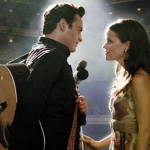 Walk the Line (2005)
Walk the Line (2005)
James Mangold’s rich, sepia-toned Johnny Cash movie is really about grown-up love in the face of failure and addiction. In other words, it’s the very best kind of American story, and it features such outstanding performances from Joaquin Phoenix as Cash and Reese Witherspoon as his wife and bandmate June Carter Cash that we all fell in love with the musicians’ relationship as well.
Superstar: The Karen Carpenter Story (1988)
Not a lot of people have seen Todd Haynes’s legally fraught short about the deceased anorexic 1970s pop icon but everyone should. Peopled by Barbie dolls as a brilliant indictment of the impossible standards imposed upon female stars, it also indicts the limitations of the genre overall while never sacrificing the plaintive magic of Carpenter. This film is as clever as it is genuinely, wholly affecting.
 I’m Not There (2007)
I’m Not There (2007)
Apparently Haynes is the reigning king of the music biopic because he directed this one as well. Starring the likes of Cate Blanchett, Heath Ledger, Christian Bale, Richard Gere, Ben Whishaw, and Marcus Carl Franklin as various iterations of Bob Dylan, this genius catalog of aliases not only encapsulates the singer’s notorious deconstruction of identity but also how the era we know as “the 1960s” really spans from Woody Guthrie’s 1940s to the Vietnam War-era 1970s – and was arguably the last time we could show our love for this country by trying to change it.
This article was originally published in Word and Film.
